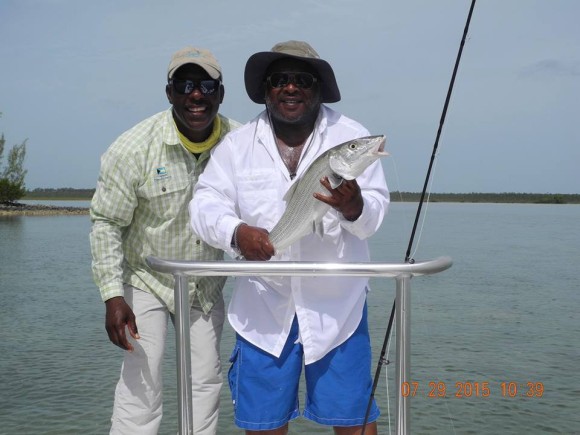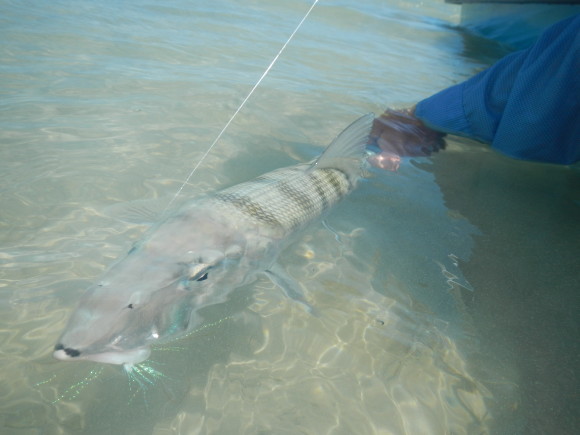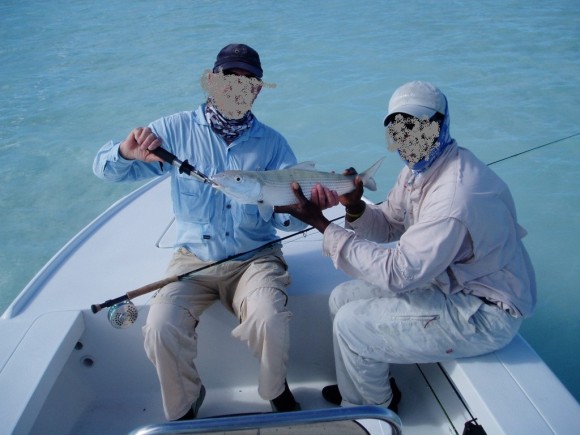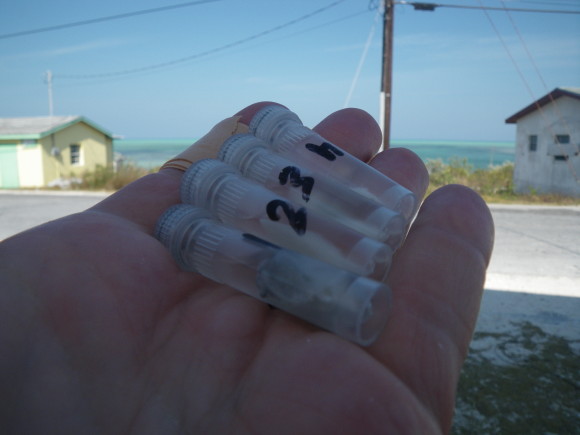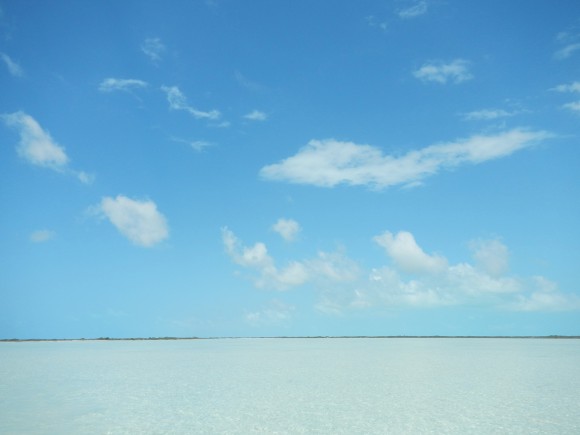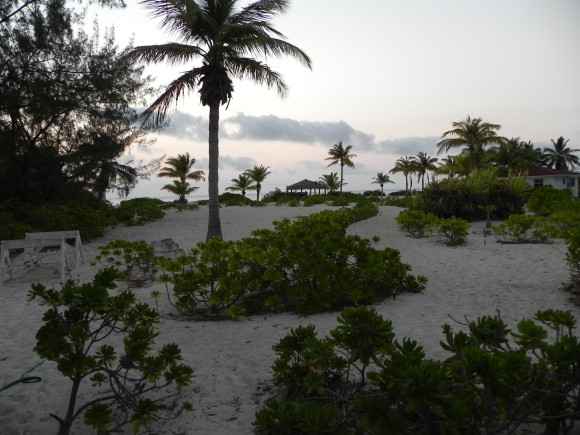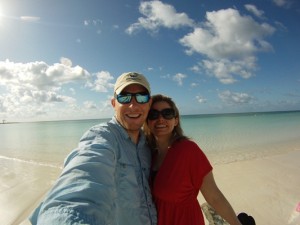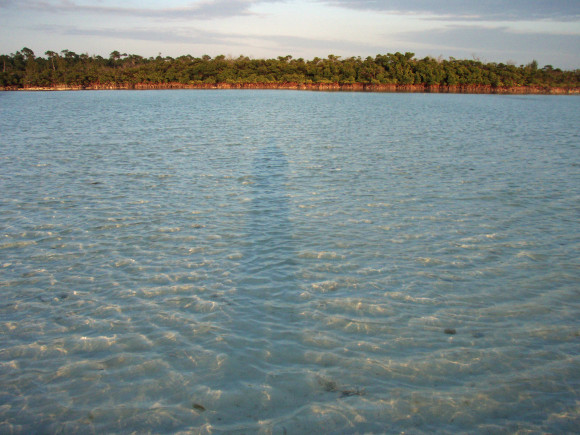
A thing of the past maybe
The first glimpse of what the BFFIA was planning got out and freaked a lot of people out. After the initial freaking out they went a little quiet. They just released Version 2.0 and it hasn’t gotten any prettier.
Here are the highlights:
- Unguided Anglers (UGAs) would be limited to designated zones set aside through consultation with guides and lodge owners. Those areas would be rotated with periodic closures like crop rotations. While it seems all the Islands could have these designated areas, Long Island, Eleuthera, Cat Island, Exuma, Acklins and Crooked Island are singled out as being in particular need of protectionist protection and DIY would be banned on these islands. This kills the DIY game fairly handily for most of us. There would be no more exploring on your own in the Bahamas. You’d have a beat assigned to you, to walk like hundreds before you. I won’t do it.
- Mother Ships banned without Bahamian guides at a 2:1 ratio. This will likely mean that some Islands, like Ragged, just don’t ever get fished (legally, at any rate).
- Fishing licenses would be easily obtainable and purchased on-line with two different prices for UGAs and guided clients, topping out at $500 a year for UGAs ($200/mo, $100/wk, $20/day). If someone can point out a more expensive annual fishing license, I’d love to see it. Also in this proposal 40% of this just goes straight to the government. That must be the pay-off.
- Guides would be trained and licensed by the BFFIA. So, a guide’s ability to guide would depend on not pissing off Prescott.
- Lodges would be licensed by the BFFIA and the Ministry of Tourism’s Hotel Division. The BFFIA, at the heart of everything, as usual.
- New lodge investments, which are done through the Foreign Investment Board, would require some sort of consultation with the BFFIA to make sure there wasn’t a burden on the fishery. This would lock in existing lodges, remove future competition and any need to improve or innovate.
- There is a bit about conservation, calls for mining and drilling bans, for creek restoration and children’s programs and for all research to be done through “The College of the Bahamas in consultation and in conjunction with BFFIA.” Again, the BFFIA puts themselves right in everything. 40% of the Fees would go to these conservation efforts, managed by the BFFIA or requiring their input and approval. Beyond mining and drilling, there are no other calls to halt development.
- There are things in there about duty exemptions for guides and lodges. Sure, why not?
- Guiding is to be limited to Bahamians. This is another solution in search of a problem.
- There is a call for added protections for Tarpon, Permit, Snook and Sting-Ray (Sting-Ray?). Um… yeah, sure.
- Wading Warden Program (responsible for manning the zoned Unguided Anglers (UGA) Flats ensuring proper handling and care of the bonefish, tarpon, permit, snook and stingray, no netting or littering). So now the folks that have harassed DIY anglers would be legitimized and given some authority to scare away the tourists. Sounds like a great plan.
There is more talk about conservation in this proposal, but it is clearly all about cementing profit and power, mostly power and almost totally in the hands of the BFFIA.
If you want to understand the nationalist, xenophobic mindset this stuff is coming from, I suggest watching this video. This is pretty classic “with us or against us” type stuff. In this case, Americans, the clients and tourists are the “them” along with anyone who questions the party line.
So, the march off the cliff continues and I can tell we anglers, we clients, we vacationers and tourists, we are wearing down under the grinding persistence of the bad news. Hell, I don’t like sounding like Chicken Little, but the sky kind of is falling.
The Bahamas has been a wonderful place and attitude and way of life for so many of us, but that is all under threat. Nothing says “Relax” quite like “National Game & Wading Wardens.” WADING WARDENS! Right?
What an effing disaster.
To all those Bahamians who say “What right do you have to say anything about what we do in the Bahamas?” Well, if we were passing a law saying Bahamians coming to Florida had to be accompanied by a licensed tour guide and only 50 Bahamians at a time could be in Miami… well… it might be a law passed in the US, but I’d think you might take offense, and rightly so. These laws are aimed at Americans (and sure, Europeans), so expect us to voice our concerns. We aren’t invading or anything (at least not unless Trump gets into office… then all bets are off, that guy’s crazy and has an eye for real estate), but we might have something to say about this giant Bahamian middle finger.
Not much left to do at this point but hope sanity reigns in the Cabinet. Reasons for hope on that front are not abundant. The BFFIA is doing everything it can to consolidate power and authority and at least the Ministry of Fisheries seems to be totally on board.

Here is the full text of the proposal:
Conservation: – Major nursery systems of Mangroves and Flats throughout The Bahamas need to be protected. Examples being the Northside of Grand Bahama, West Coast of Andros, the Joulters Cays, Bights of Acklins and Crooked Island, Westside of Abaco, Eleuthera, Long Island and Cat Island etc. This is imperative that these Mangrove habitats and flats are protected, especially Red Mangroves, as it is the primary nursery system where the juvenile fish and crustaceans grow and find protection from the predatory fish. This will increase the fish population from depletion or extinction for the continued enjoyment of Anglers and generations to come. No commercial mining or drilling of any kind should be allowed in the flats. These areas should be passed by Law as Marine Reserves. A Management Plan needs to be implemented which focuses on the opening of many blocked creeks around the Bahamas, repairs and building of boat ramps, Game Wardens Program, Wading Warden Program (responsible for manning the zoned Unguided Anglers (UGA) Flats ensuring proper handling and care of the bonefish, tarpon, permit, snook and stingray, no netting or littering), funding local children conservation educational programs and field trips and the proper handling and care of the “Catch & Release” species by Guides and Anglers. It is recommended that all mangrove, flats and reef research should be done through The College of the Bahamas in consultation and in conjunction with BFFIA. BFFIA suggests that 40% of the Fishing License Proceeds go to conservation and that a Board Member of BFFIA be appointed as Board Representative on the Government Conservation Fund Committee.
Fishing Licenses: – Fishing permits should be sold electronically and purchased via credit card or through the Department of Marine Resources, the Family Island Administrator’s Offices, Fly Shops or Lodges. Fly Shops and Lodges should be able to purchase Daily and Weekly Licenses in Bulk at a discounted rate and be able to sell to the Anglers, like we do now with Batelco Phone Cards, and send in the filled in applications to the Department of Marine Resources for their records. Persons who have a vacation home in The Bahamas should be able to purchase a year fishing license for the owners of the house. This is not for use by guests visiting their homes. BFFIA suggests that there be two (2) Categories of Fishing Licenses, Guided and Unguided. This will also assist with more accurate surveys and statistics as to the percentages of Guided and Unguided Anglers frequenting our Country’s Flats and not rely on secondhand surveys or information from Non-Bahamian Entities’ Reports. The proposed fees are as follows:
W/Guide $10 W/O Guide $20 Day
W/Guide $50 W/O Guide $100 Week
W/Guide $100 W/O Guide $200 Month
W/Guide $250 W/O Guide $500 Year
Foreign Vessels or Floating Lodges: – A Foreign Registered Vessel (needs to be defined) fishing in Bahamian waters with single or multiple flatsboats be required to purchase a sportfishing permit also for the flatsboats and a fishing license for every Angler on board. They would also be required to hire a Certified Bahamian Guide at a ratio of one to two, that is one guide to every two Anglers.
Certified Fishing Guide be employed at a ratio of one(1) to two(2), namely one guide to every two Anglers fishing in the flats.
Number 5 (2) (c): – In the Draft Legislation where is it talks about Certification of Guide and operators. It need to state “successfully completed the fly-fishing Certification program offered by BFFIA for a minimal fee.
Certification of Guides: – The legitimizing of the Fishing Guide Profession for Bahamian Citizens only. The reason being that Immigration status like permanent resident with the right to work and others have and are still being abused, especially in the commercial fishing sector. Currently foreigners are only marrying locals to have access to our Natural Resources while they continue to hold on their primary residence in their country with no allegiance to the Bahamas. General Guide License and Master Guide license should be obtained from The Department of Marine Resources, following the certification of the Bahamas Fly Fishing Industry Association. Current professional Guides, with five years or more experience should be grandfathered in, with new Guides undertaking the certification program, which would include a minimum of a year apprenticeship on the flats with a professional Guide. They would also be required to have Liability Insurance.
Certification of Lodge Operators: – The certification of lodges should be done by the Bahamas Fly Fishing Industry Association and the Ministry of Tourism Hotel licensing unit. BFFIA recommends that Foreign Investment Board should consult with BFFIA, who will discuss with members and relevant stakeholders, to evaluate the current lodge density in the proposed area to avoid over fishing and irreparable damages to the already fragile local fishery. A major concern is that Bahamians who are presently in the industry, have been placed at a very unfair disadvantage and competition, due to not having access to capital compounded with high interest rates from our local banks whereas foreign persons do not encounter these issues. The present lodges here in The Bahamas should be grandfathered in, but any Lodge going forward should be majority Bahamian owned and the Industry reserved for Bahamians.
Duty Free Exemption Fishing Lodge Operators: – The BFFIA recommends that Certified Guides should also be able to apply to the Department of Marine Resources/Minister of Finance for customs duty exemption for Boats, Trailers, Engines, Trucks, Jeeps or SUVs, Kayaks, Stand Up Paddle Boards (SUP), fly fishing gears and related supplies, so that it would improve the capability of Guides to deliver the highest level of service and safety to the Anglers.
Outfitters’ License: – Recommends that Bahamian Fly Fishing Lodges and Certified Fly fishing/flats fishing Guides who meet all the Government requirements and licensing be issued an Outfitters’ License. This would allow lodges and Certified Guides to have fly shops with the basic gear that Anglers needs on their fishing trips. Often Anglers come on a trip and find in many cases they don’t have the correct gear. Example sometime they forget their foul weather jacket, or wading boots, or the wrong fly line etc.
Prohibited Commercial Fishing in the Flats: – No commercial fishing or netting of Bonefish, Tarpon, Permit, Snook or Stingray be allowed in the flats.
Protection: – BFFIA recommends the protection of Tarpon, Permit, Snook and Sting-Ray with further strengthening of the present protection of Bonefish in the current Act. Also the need for Catch and Release practices and protection of our National Fish, the Blue Marlin (Could you imagine a Bahamian visiting the USA decides to hunt and kill the Bald-Headed Eagle. Imagine a Sovereign country where the national fish is not protected for catch and release).
DISTRIBUTION OF FISHING LICENSES: – BFFIA recommends that the fishing license fee should be distributed as follows:
40% Government
40% Conservation fund
15% Bahamas Development Bank in a special fund to help Bahamians presently and are interested in getting in to the fly fishing business. Presently a minimum of 70 percent of Bahamians are not able to make their bank payments.
5% BFFIA
National Game & Wading Wardens: – BFFIA recommends establishing a National Warden Program throughout the Country to assist in the enforcement as it relates to fishing without the proper Government Licenses, handling and care of the protected flats species, and the illegal Netting of Bonefish namely in Long Island, Andros, Acklins along with other illegal activities on the flats. A portion of the funds from the fishing license can be used to train and pay for these wardens and ensure that they are properly equipped and have access to speed boats and flatsboats for patrol etc.
Unguided Anglers (UGA): – To zone areas for Anglers with a Fishing License to fish without the assistance of a Certified Guide. (At their own risk and accepting full liability). These zoned areas must be assigned with consultation with the Local Guides and Lodges on each island because of their unique geography and usage placed on a rotation schedule to prevent overfishing .e.g. if an island has 3 zoned Unguided Anglers’ (UGA) flats one in rotation should be closed every 6 or 9 months. Islands like Long Island, Eleuthera, Cat Island, Exuma, Acklins and Crooked Island need special protection because of their the geography, the roads are constructed on the side of the islands directly on the flats, which exposes and makes the fishery very vulnerable for abuse to over fishing. UGA, because of the easy access, should not be allowed to fish these islands especially due to the limited flats, increased wading traffic and the already applied pressure on the fishery to avoid the already depletion of the fish population. Anglers should be permitted to fish on feet (wading) providing they are staying in a local fishing lodge. Their fishing license should allow them to wade on a flats near the lodge to fish. There are genuine cases where such facilities who cater to Anglers who like to fish by themselves, should be permitted, as long as they are staying at a licensed fishing lodge. Persons who have a legitimate vacation home in the Bahamas should be eligible to purchase a long term fishing permit which allows them to fish the flats. Under no circumstance, should that allow them to run an illegal business in The Bahamas from their residence. This is no different from a Mothership’s (Floating Lodge) operation on the water, where they bring in their flats boats and foreign Guides.
Again we, the Bahamas Fly Fishing Industry Association Board, would like to thank you for allowing us to voice the collective views of our members and stakeholders.
Respectfully,
Prescott Smith- President/Director
Denward Rankine- Vice President/Director
Valentino Munroe- Asst. Treasurer/Director
Shawn Leadon- Director
Kendall Williamson- Director
Nathaniel Gilbert- Director
Paul Pinder- Director
Omeko Glinton- Director
James Smith- Director
Colin Cartwright- Director
Philip Wiiliamson- Treasurer
Geneva M Wilson
Secretary
Kate Williamson
Assistant Secretary
Bahamas Fly Fishing Industry Association
Nassau, Bahamas
